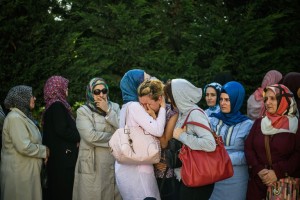Turkey, a Conduit for Fighters Joining ISIS, Begins to Feel Its Wrath
< < Go Back
When the bodies of Islamic State fighters are recovered on the Syrian battlefield, the passports found on them have often been stamped in Turkey, which thousands of recruits pass through on their way to join the terror group.
Fighters who call relatives abroad often do so using Turkish cellphone numbers, and when they need cash, they head to Western Union offices in southern Turkey, according to court and intelligence documents.
From the start of the Islamic State’s rise through the chaos of the Syrian war, Turkey has played a central, if complicated, role in the group’s story. For years, it served as a rear base, transit hub and shopping bazaar for the Islamic State, and at first, that may have protected Turkey from the violence the group has inflicted elsewhere.
Now, the Turkish government and Western officials say the suicide bombings at Istanbul’s main airport on Tuesday bore the hallmarks of an Islamic State attack, and they have added them to a growing roll call of assaults attributed to the group in Turkey in recent months.
Analysts said Turkey was paying the price for intensifying its action against the Islamic State, also known as ISIS, ISIL or Daesh. Under mounting international pressure, the country began sealing its border last year, as well as arresting and deporting suspected militants. And last summer, Turkey allowed the United States to use Incirlik Air Base to fly sorties over the group’s territory in Syria and Iraq.
“Turkey has been cracking down on some of the transit of foreign fighters who are flowing into as well as out of Turkey, and they are part of the coalition providing support, allowing their territory to be used by coalition aircraft,” the director of the Central Intelligence Agency, John O. Brennan, said in an interview this week with Yahoo News. “So there are a lot of reasons why Daesh would want to strike back.”
Soon after the government’s decision to allow airstrikes to be carried out from the base in southern Turkey, the Islamic State began naming Turkey as a target.
“Since mid-2015, a significant rise in pejorative references to the Erdogan government in Islamic State propaganda has indicated Turkey is now in its cross hairs,” Michael S. Smith II, an analyst who closely tracks the group’s messaging, said, adding that this kind of rhetoric also preceded attacks in Western Europe and beyond. “An increase in terrorist attacks in Europe, in North Africa, in Bangladesh and in the Caucasus region were all preceded by increased focus on these areas in Islamic State propaganda materials.”
The group’s long honeymoon with Turkey started with the country’s aid to rebel groups that were fighting the government of Bashar al-Assad of Syria, often with the blessing of Western intelligence agencies, according to analysts. At the start, the Islamic State fit into that category, though it then began focusing more on eliminating competitors than fighting Mr. Assad.
Among the competitors the group was killing were Turkey’s avowed enemies: Kurdish separatists sheltering in Syria and Iraq. Turkey’s Western allies began accusing it of clinging to ambivalence toward the Islamic State. Even when it began strikes against the group last summer, its actions against the Kurds were more numerous and intense.
The centrality of Turkey for foreign volunteers flocking to the Islamic State is evident in court documents and intelligence records. Dozens of young men and women were arrested by the F.B.I. in the United States and by officials in Western Europe after they booked flights to Istanbul.
By 2015, the group was advising recruits to book round-trip tickets to beach resorts in southern Turkey instead, and to be sure to spend a few days pretending to be a tourist as a ruse.
That was the technique used by Reda Hame, a 29-year-old Parisian recruit. He explained to interrogators last summer, after he was arrested upon returning to France to carry out an attack, that he had made sure to buy a package stay at a beach resort in southern Turkey specifically because he wanted to throw off investigators, who knew to look for suspects heading to Istanbul.
“Where Turkey can be accused of negligence is failing to understand, just as Pakistan did with the Taliban, that these radicals who crossed Turkey to get into Syria would morph into an organization that not only threatened the West, but ultimately itself,” Bulent Aliriza, director of the Turkey Project at the Center for Strategic and International Studies, said. “The threat assessment simply did not happen fast enough.”
More From The New York Times:




